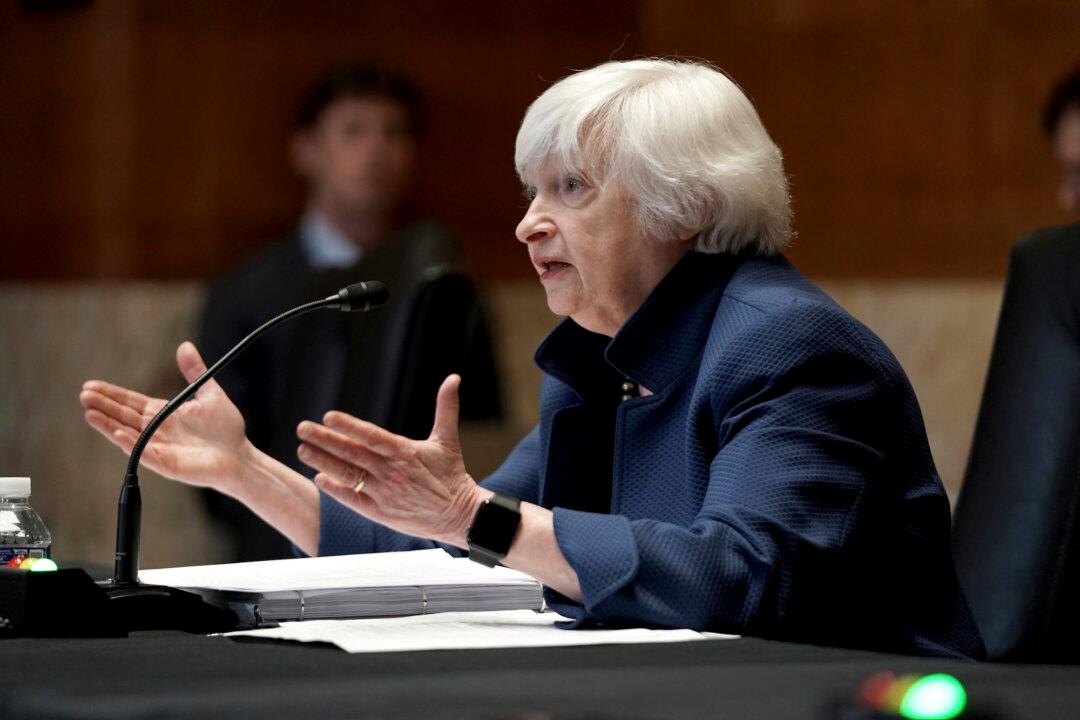Commentary
On July 16, Treasury Secretary Janet Yellen criticized President Trump’s tariffs against $360 billion worth of China’s exports. “My own personal view is that tariffs were not put in place on China in a way that was very thoughtful with respect to where there are problems and what is the U.S. interest,” Yellen said after a week’s trip in Europe. “Tariffs are taxes on consumers. In some cases, it seems to me what we did hurt American consumers, and the type of deal that the prior administration negotiated really didn’t address in many ways the fundamental problems we have with China.”
But Secretary Yellen misses the point. The response from Dr. Peter Navarro, one of Trump’s main tariff architects, was both scathing and illuminating. In an email to The Epoch Times, he wrote, “America’s Treasury Department is a captive of globalism within Wall Street and multinational corporation ranks, no matter who is in power. I fought former Treasury Secretary Steve Mnuchin constantly at Treasury—he constantly refused to implement Trump’s trade policies. Yellen is no different because Wall Street has its hooks in her and she has no clue about what happens in America’s Main Street manufacturing communities.“ Navarro added, ”Biden needs to rein her in.”
Trump, Navarro, and others in the former administration implemented the China tariffs as an economic and national security strategy to protect American industry and recover economic damages from as much as $600 billion in Chinese intellectual property theft every year. They saw tariffs as an unwanted but necessary corrective against China’s predatory trade practices, and persistent efforts to undermine the U.S. economy and American innovation.
“In a world of unfair trade, tariffs represent an essential tool to level the playing field for American workers and manufacturers to compete against all manner of trade cheating and sweatshop labor,” Navarro wrote.
He noted in his emails that America’s steel, aluminum, and some consumer durables received essential support from the tariffs. “The Trump Administration saved America’s steel and aluminum industries with tariffs that defended against unfair and massive dumping,” he wrote.
Dumping is a predatory economic tactic used by foreign exporters to weaken the industries of competitors. When dumping, foreign entities deliberately price their exports at below “fair market value” to drive competitors out of the market. When competitors go bankrupt and exit the market, foreign entities leverage their monopoly positions in the U.S. market to increase prices to oppressive levels or withhold the goods from U.S. consumers altogether. Dumping is recognized by the World Trade Organization (WTO) as a practice that may be countered by tariffs.
The Trump tariffs were geared to protect American manufacturing, which the former administration saw as strategic. Their principle was, “economic security is national security.” Industries must remain strong and resilient to provide jobs, a skilled workforce, contribute to the overall U.S. economy, and provide a healthy manufacturing ecosystem whereby items that are essential to national security—from ventilators to aircraft engines, from supercomputers to 5G base stations—can be researched, developed, and produced with secure supply chains in the United States.
A robust industrial base is valuable in and of itself, and includes the production of consumer goods that might not otherwise be considered strategic to national security, but are nevertheless important to the U.S. economy and American innovation. The goal with the tariffs is not lower prices, but jobs that heighten purchasing power, and an industrial base that saves lives during an emergency. Increasing government revenues and the purchasing power of workers through better manufacturing jobs can offset any price increases that may result.
The positive effects are not always immediate. Asked about the weakening U.S. auto sector, even during the Trump era, Navarro replied, “Trump was successful in renegotiating NAFTA but the benefits for the auto industry will take several years to manifest. The secret of the USMCA [United States-Mexico-Canada Trade Agreement] is the strict domestic content rules which we were able to negotiate.”
On Yellen’s implied attribution of high prices to tariffs, Navarro replied:
“The current inflation spike is attributable to four main forces: massive fiscal and monetary stimulus, bottlenecks in the production process and supply chain due to the pandemic, Joe Biden’s war on oil and natural gas, and wage inflation as a result of structural imbalances in the labor market, again the result of the pandemic. Tariffs have absolutely nothing at all to do with inflation. Zero, zip, nada. We had tariffs for years during the Trump administration without inflation. This is a Biden administration phenomenon. Inflation fell during the Trump administration because of a combination of strong growth and rising productivity coupled with strategic energy dominance and deregulation. China absorbed any possible inflationary effects from the tariffs by devaluing its currency.”
Navarro attributed a persistent lack of understanding of blue-collar concerns in the U.S. Treasury Department to the influence that U.S. financial institutions have through a Wall Street staffing pipeline. To fix the problem at Treasury, he said, “You must start by throwing out the Wall Street trash, particularly the Goldman Sachs trash, that perennially staffs that bureaucracy. Then you need a Secretary of the Treasury that understands blue-collar America, which clearly neither Mnuchin nor Janet Yellen did or do.”
Anders Corr has a bachelor’s/master’s in political science from Yale University (2001) and a doctorate in government from Harvard University (2008). He’s a principal at Corr Analytics Inc., publisher of the Journal of Political Risk, and has conducted extensive research in North America, Europe, and Asia. He authored “The Concentration of Power” (forthcoming in 2021) and “No Trespassing,” and edited “Great Powers, Grand Strategies.”





